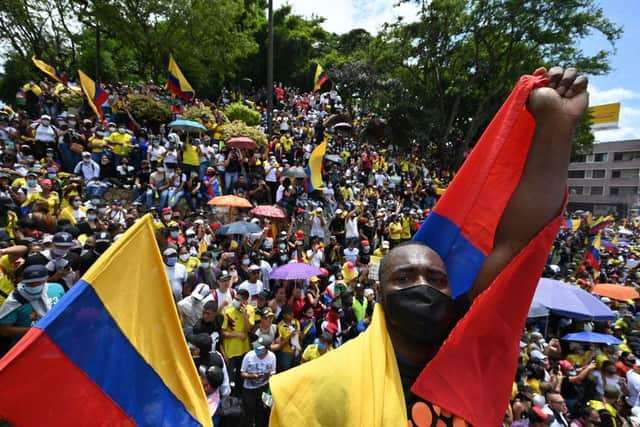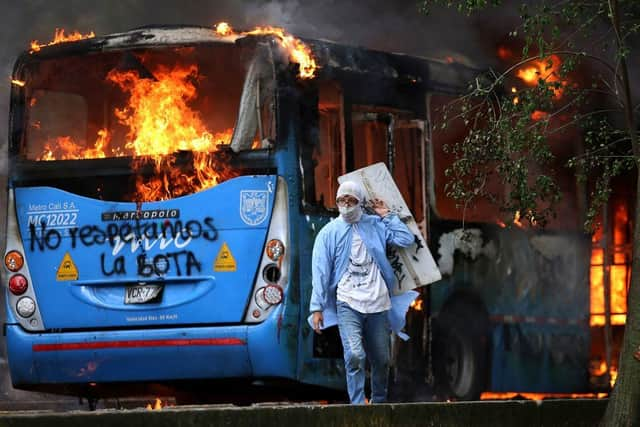What is happening in Colombia? 2021 protests explained as continued violence against demonstrators claims lives
This article contains affiliate links. We may earn a small commission on items purchased through this article, but that does not affect our editorial judgement.
The UN has expressed its indignation over the Colombian police’s handling of protest in the South American country.
At many as 37 people are thought to have been killed in clashes in recent days, with authorities opening fire on protesters speaking out against tax increases and the privatisation of healthcare. That number is expected to rise.
Advertisement
Hide AdAdvertisement
Hide AdThe number of injured is thought to be over 800, while at least 89 people have been reported missing.


Here is everything you need to know about it.
Why are people protesting in Colombia?
The protests have been going on for a number of days, with the first reports of civil unrest coming in on 28 April.
Demonstrators have been fighting back against tax increases designed to expand funding to Ingreso Solidario, a universal basic income social program established in April 2020 to provide relief during the Covid-19 pandemic in Colombia.


Ingreso Solidario provides monthly payments of around $43 (£31) to low-income populations, with roughly three million of Colombia’s population of 50 million eligible for payments.
The social program is comparatively small when placed alongside other Latin American countries’ Covid relief plans, and has been criticised for not reaching nearly enough of the citizens who would benefit greatly from the payments.
The Government – under the leadership of president Iván Duque Márquez – intended to increase funding to the program through tax reforms, with a plan of generating $4.8 billion (£3.5 billion), and offering the program to a further 1.7 million citizens.
The reforms included a rise of VAT on more products like food and utilities, the addition of some middle-class earners into a higher tax bracket and the removal of various income tax exemptions.
Colombians have also been angered by Bill 010, proposed to reform health care in Colombia by making the system more privatised.
Advertisement
Hide AdAdvertisement
Hide AdThose plans would likely have seeded unrest in any year, but proposals to introduce Bill 010 during a pandemic (Colombia is currently experiencing the third-highest number of Covid-19 deaths in Latin America), and the fact the bill was filed through a special committee in the House of Representatives that did not require congressional debate, have caused uproar.
Protesters have also been demanding a litany of other requests, which has only grown in response to the police violence.
They are also campaigning for a universal basic income at the nation's minimum wage, additional support for small businesses, a ban on using certain herbicides, and an end to the crackdown on the protests themselves.
How many people have been killed?
Though the protests have been going on for almost a week, they reached a peak on 1 May (International Workers' Day or May Day).
On that date, the Ombudsman of Colombia reported that that six people had died during protests, including five civilians and one police officer, and that 179 civilians and 216 police officers were injured.
However, these numbers were disputed by human rights groups and non-governmental organisations providing differering figures, with some claiming at least 27 people had died.
The Colombian Federation of Education Workers (Fecode), which helped lead protests, has reported thousands of human rights violations, which the government denies.
These include over 1,000 instances of police violence, more than 700 arbitrary detentions and six acts of sexual violence.
Advertisement
Hide AdAdvertisement
Hide AdColombia’s largest news outlets have also been criticised for instilling fear against protestors, and focusing on acts of vandalism rather than the true issues at the heart of the demonstrations.
Fresh clashes broke out on Wednesday (5 May) in Bogotá and other cities across the country, as armoured police unleashed an arsenal of flash-bangs, teargas and water cannons on protesters.
Have the protests worked?
To an extent, the protests do seem to have made a difference. At least for now.
Initially, President Duque announced that he would not be removing his tax reform plans. He later stated his government would consider removing some of the more controversial proposals from the plans.
However, following May Day, Duque announced that he was withdrawing the tax reform.
That may seem like a victory for the demonstrators, but the president has said that tax reforms are still “necessary” for Colombia, hinting that the plans may be implemented again at a later date once the unrest has died down.
He has also been authorising the deployment of more troops to crackdown on demonstrations, and his government refuse to recognise state violence against the protestors, instead drawing attention to the “vandalism” of the campaigners.
What happens next?
Despite the removal of the tax reforms, protests continue in Colombia.
Advertisement
Hide AdAdvertisement
Hide AdThe country’s National Strike Committee announced that another day of protests was to be held on 5 May, criticising the government for not convening with groups to make negotiations.
Those protests did indeed occur, and led to more widespread police violence against demonstrators.
In the city of Pereira, a firearm attack against a peaceful protest injured three people; as of now, the perpetrator of the attack is unknown.
A message from the editor:
Thank you for reading. NationalWorld is a new national news brand, produced by a team of journalists, editors, video producers and designers who live and work across the UK. Find out more about who’s who in the team, and our editorial values. We want to start a community among our readers, so please follow us on Facebook, Twitter and Instagram, and keep the conversation going.